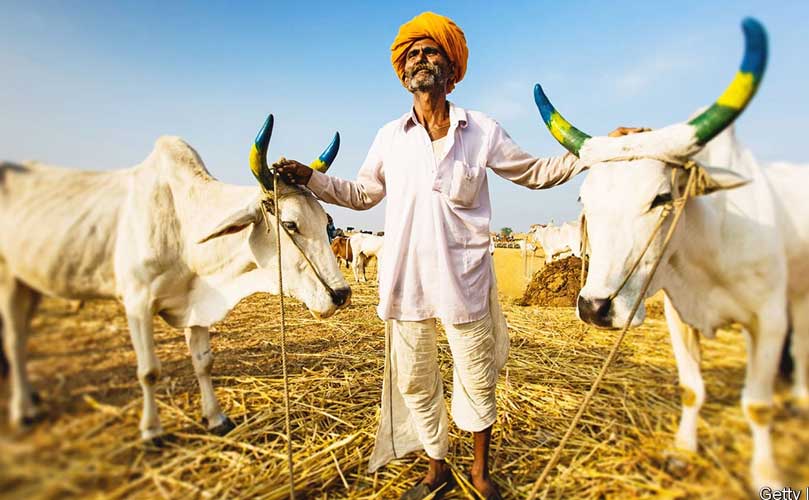
Cows in India and Hindu mythology, from our blog https://www.paylesstoursindiablog.com/2020/05/cows-in-india-and-hindu-mythology-india.html
India is home to the largest livestock population in the world, including of course sacred cows. The fact is that a cow in India is seen as an extremely respected animal, and cattle slaughter is prohibited in 20 states, illegal slaughter is punishable by imprisonment, in some states up to 10 years and one has to pay a fine. In India, McDonald's restaurants are the only ones in the world to sell vegetarian burgers or the chicken ones. In the ancient sacred of Hindu religion the cow is associated with the deity of Prythwi, that is the mother of all living beings or Krishna, who was a cow lover and its shepherd. In Hindu mythology, a cow leads people through death up to the heaven. Hence, the bull Nandi is the transport of the god Shiva. Kamadhenu cow horns symbolize the gods, four cow legs - ancient Hindu scriptures or "Vedas", udders - four goals of life, including material wealth, desire, righteousness and salvation.
Sacred cows in India
So you can find cows in India in many places such as temples, beaches, bridges, roads, as well as the streets and roads of such big
cities such as Delhi or Mumbai. In Goa, cows on the beaches are a tourist attraction and remind us that Goa is still India. Cows are undoubtedly a tourist attraction and many of us can not imagine India without a cow or a photo with a cow.
There are organizations such as "Gau Rakshak" or "Gau Rakshak Dal Haryana," Serve cows ", which are particularly concerned about cows' rights and protections, they call these animals divine beings, other organizations are also helping the sick or injured cattle - 'People for Cattle in India' (PFCI). In many places in India, urine is sold to cows, which is used as a remedy for problems with anemia, skin or cancer. From cow dung for example, soaps for skin problems or insect repellents are made, or it is used by rural people to light fires. The government has also started to create cow shelters and cow hostels in many Indian cities to protect them.
Are the cows really so sacred? , another contrast of INDIA
However, there is one issue that does not fully agree with what is commonly said about cows. We can say this is another contrast of India.
Why are there so many cattle in the Indian streets? The esiest answer is TII - This is India:)
Namely, in the last few years a lot has been said about stray cattle
causing accidents and havoc. Some of these animals look also malnourished, feeding on trash and leftovers thrown on city streets, living at the mercy of people who love them and take care of them
feeding them with grass or chapati. Stray cattle in spite of really careful driving of Indian people are sometimes the victims of accidents on the road, as well as on railway tracks, not to mention that they cause accidents and chaos on streets and roads. The reason for this in most cases are farmers who get rid of non-productive cattle abandoning them on the street, for example, cows have stopped giving milk and farmers have no money to support them.
There is also a tradition in India, Anna Pratha, according to this tradition, people leave cows on the streets of cities in the hope that they will become pregnant and return to their farms. Proponents of this tradition think that they follow the tradition and their actions are justified. Another reason for many cows and cattle on city streets is the ban on slaughtering them.
India is the world's third largest beef exporter
From year to year we can see increase in the number of cattle illegally transported for slaughter to countries such as Bangladesh or Burma or Indian states, where the ban doesn't apply. The reason for that is water buffalo meat (water buffalo species) is considered beef. About 90 percent of the meat exported abroad comes from these animals.
The issue of regulating the protection and care of cows should be regulated by the Government, if only for such a trivial reason as the perception of these animals as sacred. The government should take care of creating the right infrastructure for these animals, and not just push the problem aside or pretend it doesn't exist. From year to year, however, I see fewer and fewer cattle on the streets of larger cities and more shelters for cows and other animals are being built, so there is a chance that the situation of these animals will improve. For now, the comforting thing is that there are still many people in India who really care about cows and do not treat them solely as a source of food.